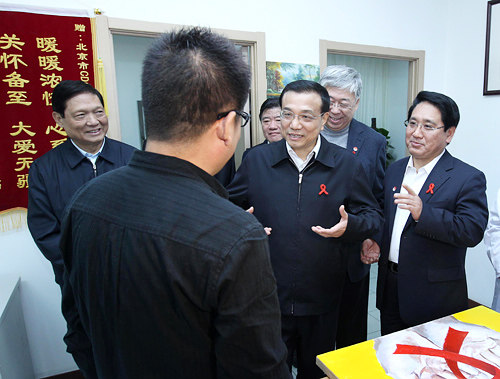|
 |
|
ASSISTANCE COMMITMENT: Vice Premier Li Keqiang (center) visits HIV/AIDS NGOs at the Beijing Disease Prevention and Control Center on November 18. Li pledged the establishment of a mechanism that would involve "social force" in HIV/AIDS prevention and control (PANG XINGLEI) |
Climate Countermeasures
China will tackle climate change on 11 principal fronts between 2011and 2015, said a white paper released by the Chinese Government on November 22.
According to the white paper, titled China's Policies and Actions for Addressing Climate Change, in the next five years, China will strengthen its legal system, adopt more strategic planning, accelerate economic restructuring, refine its current energy policies and develop clean energy to fulfill its goal.
China aims to reduce its carbon dioxide emissions per 10,000 yuan ($1,571) of GDP by 17 percent by 2015 and energy consumption per 10,000 yuan of GDP by 16 percent, as compared with usage in 2010.
China has introduced an overall framework for energy conservation, emission reduction and greenhouse gas emission control for the five-year period by releasing the Comprehensive Work Plan for Energy Conservation and Emission Reduction during the 2011-15 period and the Work Plan for Greenhouse Gas Emission Control this year, the white paper said.
Anti-bribery Regulation
China has introduced a regulation that clarifies the thresholds for criminal prosecution in cases involving Chinese nationals bribing foreigners working in the country.
The regulation, jointly issued by the Supreme People's Procuratorate and the Ministry of Public Security on November 21, said Chinese nationals who bribe foreigners working in China or officials with international organizations with more than 10,000 yuan ($1,539) for illegitimate commercial gains, will be prosecuted.
For Chinese organizations, any cases involving more than 200,000 yuan ($31,428) in bribes to foreigners working in China or officials with international organizations, will be filed for prosecution.
Bribing foreigners working in China or officials with international organizations became criminal offences under the eighth amendment to China's Criminal Law that came into effect on May 1.
Emergency Alerts
The China Meteorological Administration said on November 22 the country had begun establishing a system to publish emergency alerts that would ensure that residents receive timely warnings about natural disasters, accidents, threats to public health and social security issues.
The system is expected to be put into place nationwide at the end of 2012 and will cover 82 percent of the country's population. It will send alerts via radio, TV, text messages and other media to ensure that residents receive notice of any threats within 10 minutes.
To date, 136 million yuan ($21.42 million) has been invested in the system.
Protein Discovery
Chinese scientists have discovered a key protein that could help produce stem cells more efficiently.
The protein aids the production of induced pluripotent stem (IPS) cells.
IPS cells are stem cells, which are artificially derived from non-pluripotent cells. These cells have huge potential for bioengineering and medical applications that will cure human diseases.
A research team from the Guangzhou Institute of Biomedicine and Health in Guangdong Province along with the Chinese Academy of Sciences identified a special enzyme that is able to significantly improve the current procedure used to transform a normal body cell into an IPS cell.
The discovery was published in an online edition of the international journal Cell, Stem Cell on November 18, and will be published in print in December. | 